Landmark College Launches Employment Readiness Program

by Madeline Bergstrom
PUTNEY, Vt. – In 2016, Landmark College created a new program called Landmark College Works, designed to boost students’ career development skills and prepare them for success in the workplace. A key element of Landmark College Works is the Employment Readiness Experience (ERE), launched this month by the College’s Office of Transfer, Career, and Internship (TCI) Services.
ERE provides a short-term, structured on-campus employment experience to students during Landmark College’s January Term. With the “new to the workforce” student in mind, the program pairs an on-campus job with classroom work focusing on professional skills, communication, and career exploration.
“ERE and Landmark College Works are examples of how deep and powerful the LC model has become,” said Dr. Peter Eden, Landmark College’s president. “We recognize that students must be prepared for life after college, and we understand that during college is the optimal time for students to gain confidence in themselves as future contributing citizens.”
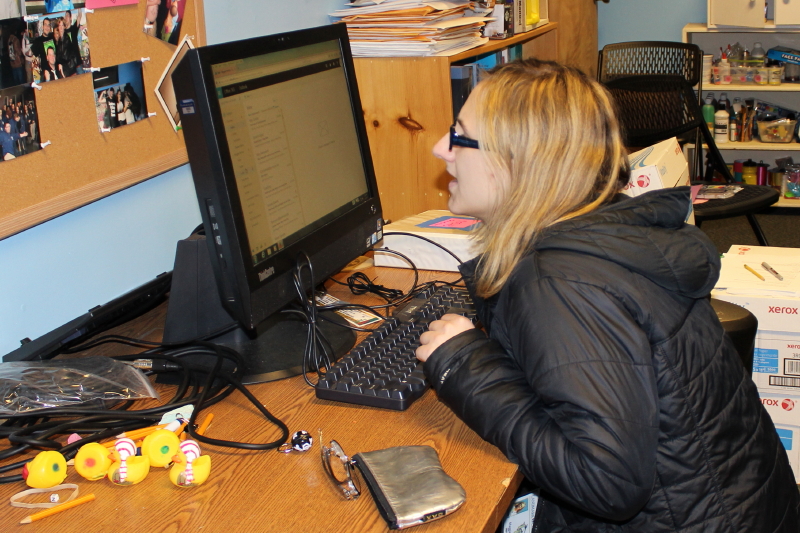
This year represents the “soft launch” of the ERE, with five students participating in the program. “The response to the program has been outstanding, demonstrating that there is a real need for this type of programming,” said Jessica Nelson, associate director of TCI and coordinator of the program. “We could have filled the first class four times over, but we wanted to keep the initial launch small, as this is a new model in college workforce development.” The program will expand to serve more students in future years and will eventually run during the summer as well as in January.
This January’s ERE students are employed in the Landmark College offices of Marketing and Communications, Enrollment Management, Student Activities, Financial Aid, and TCI. In conjunction with hands-on work experience, they spend time in the classroom reflecting on their experiences and engaging in activities that will strengthen their professional skills. During class time, students write about their workday, share questions, and discuss aspects of workplace culture.
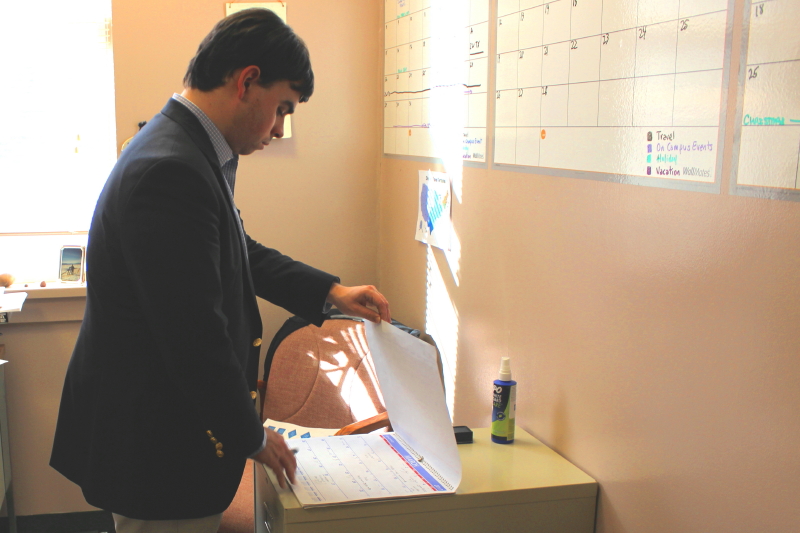
“For students who lack formal work experiences,” said Nelson, “having an academic class that parallels and supports what they are doing on the job allows them to really digest and absorb all the new information they are learning, and immediately put professional skills and concepts into practice. They are not just learning about it abstractly in hopes of future employment.”
This support helps to ensure that the students gain the maximum possible benefit from their short-term work experience. The goal of the program is to prepare students for the next step along their career path, whether this is a longer-term on-campus job, a summer job, or an internship on- or off-campus.
“We know that the optimal environment to help students develop career- and employment-related skills is right here on our campus, so rich in resources and support,” Dr. Eden said. “ERE will allow students to hone the tangible and intangible elements that are needed for success in the workforce—and ERE will provide this through a ‘learning and doing’ framework that recognizes individual strengths and challenges.”
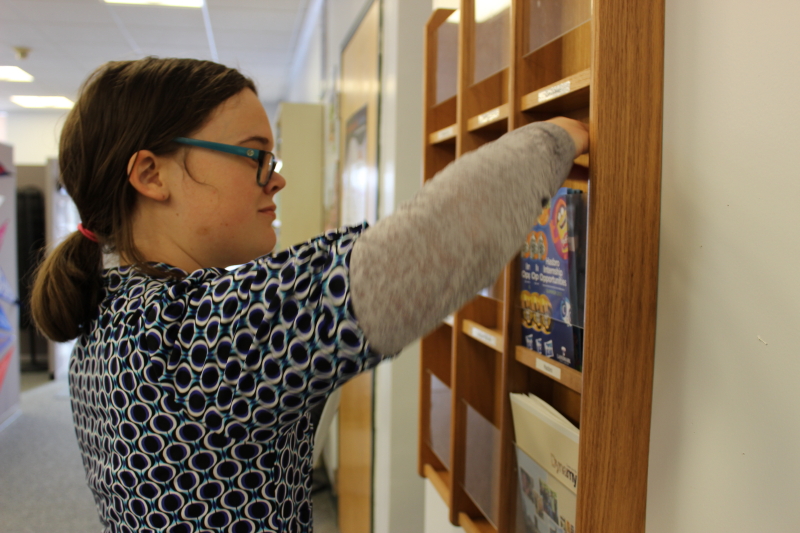
“I think of it as a stepping stone,” said Megan Freeman, who is employed in the TCI Services office this month. “I think this is a good thing to prepare me for the next step.” Freeman aspires to work with the elderly as an events coordinator in a nursing home. She said that the Employment Readiness Experience has been “really good, because it’s helped me think—how do I double-task, how do I organize.”
Maggie Perdue, who is working in Student Activities, said that the ERE had taught her about “how to deal with coworkers.” In the future, Perdue hopes to work as a props master in the theater and a docent in a museum.
“I’m learning and developing new skills,” said William Epifanio. He listed the practical skills he’s acquired and mentioned that working in the Admissions office has also been personally meaningful to him because he wants to “encourage new and transfer students to come and study here.”
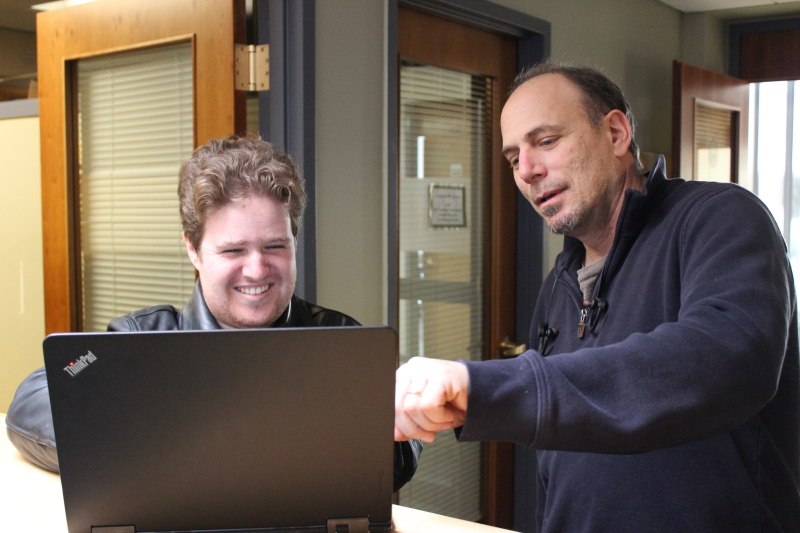
Before interning in the Marketing and Communications office, Jackson Hunter worked as a counselor-in-training at a camp for stutterers and a volunteer counselor at a camp for the blind. He is interested in video game design and will be taking computer science courses at Landmark College during the spring semester. He earned an associate of arts degree from Landmark College in December and has been accepted to Southern Oregon University (his top choice) and the University of Denver for the fall.
“It makes a difference having a class in the morning and applying what we learn in the class to work in the afternoon,” said Hunter, who photographed his fellow ERE students for this article. “It’s a great experience learning the skills needed in a workplace at a place where you already feel successful.”
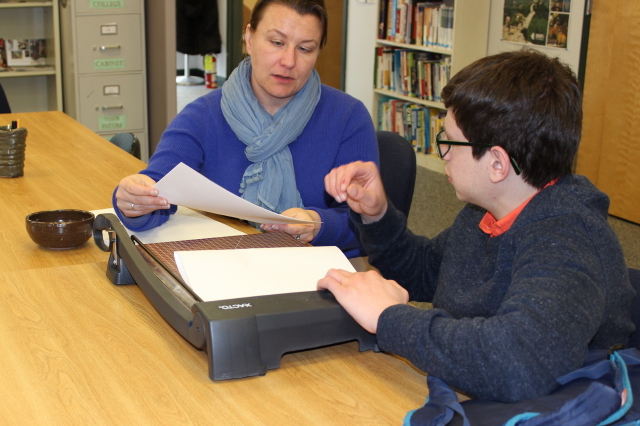
Ben Raskin-Gross, who is working in the Financial Aid office, said that to succeed in the ERE, “you have to be in the right mindset, to learn new skills that you thought you wouldn’t be capable of.” Raskin-Gross’s career goal is to be a teacher or a nurse.
Speaking to students considering the program in the future, Freeman said, “You shouldn’t be afraid to do it. It’s been a really fun experience!”
Along with the expansion of the College's internship program, "the ERE is evidence of LC’s commitment to workforce preparation for our students," Dr. Eden said. "Families expect colleges to prepare students for careers, and LC is committed to serving that important goal."